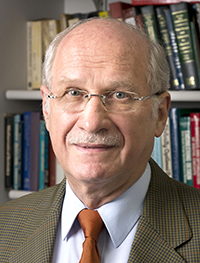 |
Ignacio Grossmann
R. R. Dean University Professor
Department of Chemical Engineering
Carnegie Mellon University
Pittsburg, PA
Ignacio E. Grossmann is the R. R. Dean University Professor of Chemical Engineering, and former Department Head at Carnegie Mellon University. He obtained his B.S. degree at the Universidad Iberoamericana, Mexico City, in 1974, and his M.S. and Ph.D. at Imperial College in 1975 and 1977, respectively. He is a member and former director (2005-2015) of the "Center for Advanced Process Decision-making," an industrial consortium that involves about 20 petroleum, chemical, engineering and software companies. He is a member of the National Academy of Engineering, and associate editor of AIChE Journal. He has received the following AIChE awards, Computing in Chemical Engineering, William H. Walker for Excellence in Publications, Warren Lewis for Excellence in Education, and Research Excellence in Sustainable Engineering. In 2015 he was the first recipient of the Sargent Medal by the IChemE. He has honorary doctorates from Abo Akademi in Finland, University of Maribor in Slovenia, Technical University of Dortmund in Germany, University of Cantabria in Spain, and from the Russian Kazan National Research Technological University. He has been named Thomson Reuters Highly Cited Researcher in 2014-2016. His research interests are in the areas of mixed-integer, disjunctive and stochastic programming, energy systems including petroleum, shale gas and biofuels, water networks, and planning and scheduling for enterprise-wide optimization. He has authored more than 500 papers, several monographs on design cases studies, and the textbook "Systematic Methods of Chemical Process Design," which he co-authored with Larry Biegler and Art Westerberg. He has also organized the Virtual Library on Process Systems Engineering. Professor Grossmann has graduated 56 Ph.D. and 11 M.S. students.
Lecture 1: Role of Process Systems Engineering in Chemical Engineering
Tuesday, May 2, 2017
Reception at 3:30 p.m., Cheney Room/1413 Engineering Hall
Lecture at 4:00 p.m.,
1800 Engineering Hall
Lecture 2: Recent Advances in Computational Models for the Discrete and Continuous Models of Industrial Process Systems
Thursday, May 4, 2017
Reception at 3:30 p.m., Cheney Room/1413 Engineering Hall
Lecture at 4:00 p.m.,
1800 Engineering Hall
Lecture 1 abstract
Role of Process Systems Engineering in Chemical Engineering
In this talk we give a general overview of the nature of Process Systems Engineering, discuss some current major trends, and show how it fits in this Chemical Engineering and the role it might play in the future. After briefly reviewing the history of Chemical Engineering, we highlight how academic research over the last decade has had a strong push towards science, largely due to emergence of areas like nanotechnology and biotechnology, which has caused some disconnect between academia and industry. However, despite these trends, Process Systems Engineering (PSE) remains a core area in Chemical Engineering that one the one hand has expanded its scope from the process engineering level down to the molecular level, and up to the enterprise and global level. Furthermore, PSE is again regaining prominence due to the increasing importance of the areas of energy and sustainability. Traditionally, PSE has been subdivided into process design, process control and process operations. In this talk we argue why PSE is becoming broader in terms of scope due to future trends.
We describe three major trends in Process Systems Engineering that have emerged over the last decade and that can potentially help the industry to innovate and to remain competitive. First, we describe efforts for simultaneous product and process design, where the emphasis lies in tying the molecular structure of the products with the processing and macroscopic properties of the product. Second, we describe work that is aimed at modeling and optimizing processes for effectively exploiting fossil fuels like shale gas and alternative sources like biomass. We also address the issue of efficiently managing natural resources such as water. Third, we describe research efforts in enterprise-wide optimization that are aimed at designing and operating supply chains for the process industry in which planning, scheduling and control can be integrated more effectively. We conclude that Process Systems Engineering is broadening its scope in order to address problems that are of current and future interest.
Lecture 2 abstract
Recent Advances in Computational Models for the Discrete and Continuous Optimization of Industrial Process Systems
In this seminar we give an overview of recent models and algorithms for the discrete and continuous optimization of a variety of challenging applications in Process Systems Engineering, and that have been largely the result of collaborations with industry. We first provide a brief overview of deterministic modelsbased on mixed-integer linear/nonlinear programming (MILP/MINLP) to highlight the progress that has been made. Next, we provide a brief review of global optimization for which the progress is illustrated with the synthesis of integrated water networks, with the design of centralized and distributed manufacturing for biomass, and with the design and planning of infrastructures for shale gas production that involve large scale nonconvex MINLP models. In order to improve the prediction of lower bounds for convex and nonconvex MINLP problems, we describe theoretical procedures based on generalized disjunctive programming for strengthening the corresponding continuous relaxations, and for which effective cutting plane methods have been developed as will be shown with numerical results on test problems. Finally, we address the handling of uncertainty in discrete/continuous models through approaches that are based on robust optimization and stochastic programming. For the former, we consider affine-adjustable recourse to avoid overly conservative results, and which is illustrated in cryogenic storage in air separation plants that participate in the electricity and operating reserve markets. For the case of stochastic programming, we consider first the development of strategies based on decomposition and that can handle a very large number of scenario; this we illustrate with optimal design of supply chains that are subjected to disruptions in their distribution centers. Finally, we consider multistage stochastic programming models that involve exogenous and endogenous parameters for which effective theoretical and solution methods are proposed. These are applied to the design and planning of offshore facilities with uncertain crude oil prices and reservoir sizes.
